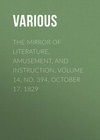Read the book: «The Mirror of Literature, Amusement, and Instruction. Volume 14, No. 394, October 17, 1829», page 4
UNPUBLISHED LINES ON DR. JOHNSON
By the late Dr. Wolcot. (Peter Pindar.)
I own I like not Johnson's turgid style,
That gives an inch the importance of a mile;
Casts of manure a wagon-load around
To raise a simple daisy from the ground;
Uplifts the club of Hercules—for what?—
To crush a butterfly or brain a gnat;
Creates a whirlwind from the earth to draw
A goose's feather or exalt a straw;
Sets wheels on wheels in motion—such a clatter!
To force up one poor nipperkin of water;
Bids ocean labour with tremendous roar,
To heave a cockle-shell upon the shore.
Alike in every theme his pompous art,
Heaven's awful thunder, or a rumbling cart!
New Monthly Magazine.
GAS LIGHTS
We have now been so long accustomed to this new light in the streets, that, like all other terrene goods, we have almost become insensible to its blessings. Yet let him who desires to know what he owes to chemistry and "Old Murdoch," turn into any of the streets still lighted with oil, and then come back to the nocturnal day of the Strand or Pall Mall. The parish oil lamps were like light-houses on the ocean; guides, not lights; the gas has become a perpetual full moon; and it may assuredly be pronounced one of the most splendid and valuable applications of chemistry. Why has not old Murdoch his statue? He deserves it even better than his master; for the master was well paid in solid pudding. In other days, that statue would have equalled the Colossus at Rhodes, and the demi-philosopher would have breathed flame like the Chimera; in the fabulous ages before that, he would have come down to us a god, or a demi-god, the rival of Prometheus, Hercules, and Atlas. Why not cast him in Achillean brass, the rival of the great hero of gunpowder and Waterloo, and make him breathe gas like the Dragon of Wantley, to illuminate the triumphal arch. Ingrata Patria!
The new light! yes, much has been heard of its power and influence; but what has the new light of all the preachers done for the morality and order of London, compared to what has been effected by this new light. Old Murdoch alone, has suppressed more vice than the Suppression Society; and has been a greater police officer into the bargain than old Colquhoun and Sir Richard Birnie united. It is not only that men are afraid to be wicked when light is looking at them, but they are ashamed also; the reformation is applied to the right place. Where does vice resort? Where it can hide; in darkness, says the preacher, because its deeds are deeds of darkness. Seek it in Pudding-lane, and Dyot-street, and the abysses of Westminster. Why was not this new light preached to them long ago: twenty bushels of it would have been of more value than as many chaldrons of sermons, and taking even the explosions of the inspector into the bargain. But it is well, that this is at length to be compulsory; since it is never too late. Thieves and rogues are like moths in blankets: bring the sun to shine on them, and they can neither live nor breed. Let the Duke of Wellington place a gas-lamp at every door of these infernal abodes; and since they cannot be smoked out, make their houses as much like glass, on the principle of the old Roman, as we can compass. This is the remedy; at least till common sense will condescend to the better expedient of pulling down and laying open all these retreats of misery and vice; the disgrace and the nuisance of London, and not less a standing inhumanity to the poor themselves.—Westminster Review.
CAPE WINES
The commerce at the Cape is wine; and the vine has already increased tenfold, since the colony became British. But unfortunately more attention has been hitherto paid to quantity than to quality, except on the farms which yield Constantia. The latter have an eastern exposure, and are sheltered from the south-west, the only injurious blast. The soil being a deposit from the neighbouring mountains, is light, but enriched by manure. The subsoil, which is even more important, is still lighter, being mixed with sand and broken stone; on the contrary, in Drachenstein, where the chief vineyards are at present, the subsoil being clay, the wine receives an unpleasant flavour, the idea of which is inseparably associated with the very name of Cape wine. It is unnecessary to enter into the subject of its manufacture. If the subsoil be bad, so will the wine be. The vine does not require a rich subsoil. In Italy, flags are laid to prevent the roots from penetrating into clay; and in England, rubbish is thrown in to make a subsoil that shall not be so rich as to produce leaves, instead of fruit. It would be advantageous were premiums offered for wine that had not been produced from clay of subsoil, but had been reared in trellis, as requiring less labour than the standard, and made on a pure and good system, instead of being mixed with Cape brandy, or sulphuric acid, &c. Notwithstanding all these disadvantages, Cape wine is generally sold in England under the names, and at the prices, of Madeira, Sherry, Teneriffe, Stem, Pontac, and above all, Hock.—Gill's Repository.
A VIEW OF LONDON
The finest view in London is from the top of Whitehall Place, looking towards the river; but then you must see it as I did, at the same hour, and under similar circumstances.
It was about a fortnight since I beheld that memorable spectacle. I was on my way home, having dined with a friend, who, though not an habitual votary of Bacchus, occasionally sacrifices to the god with intense and absorbing zeal. After dinner we adjourned to the Opera, having only determined to renew at supper our intimacy with certain flasks of Champagne, which lay in their icy baths coolly expecting our return. We carried our determination into effect to the fullest extent; and at half-past three o'clock we parted, deeply impressed with a sense of each other's good qualities, and with as keen and lively an appetite for the sublime and beautiful as an X of Champagne2 usually imparts to its warm-hearted admirers. My way led me through Whitehall, at least I found myself there, as "Charles," the guardian of the night, was announcing the fourth hour. As my good fortune would have it, I happened to look towards the river, and never, while memory holds her seat, shall I forget the sight which presented itself. Six distinct St. Pauls lifted themselves through the cloudless morning air (so pure, that the smoke of a single cigar would defile it: I extinguished mine in awe) towards the blue transparent sky; nearer, and beneath this stately city of temples, were four Waterloo Bridges, piling their long arcades in graceful and harmonious regularity one above the other, with the chaste and lofty symmetry of a mighty aqueduct; while far away, in the dim distance, a dome of gigantic dimensions was faintly visible, as if presiding over the scene, linking shadow and substance, uniting the material with the intellectual world, like the realization of a grand architectural dream. Talk not to me of the Eternal City—in her proudest days of imperial magnificence she could not furnish such a view—thrice be that Champagne lauded!—Monthly Magazine.
NEW YORK
The distant view of New York, almost free from smoke, is singularly bright and lively; in some respects it refreshes a recollection of the sea-bound cities of the Mediterranean. The lower parts of the interior, next to the warehouses, resemble Liverpool; but the boast of the city is Broadway, a street that, for extent and beauty, the Trongate of Glasgow, which it somewhat resembles in general effect, alone excels. The style of the Trongate is, if the expression may be used, of a more massy and magnificent character, but there is a lightness in that of Broadway which most people will prefer. Those who compare the latter with Oxford-street, in London, do it injustice; for, although the shops in Oxford-street display a richer show of merchandize, the buildings are neither of equal consequence nor magnitude. Regent-street in London, is of course always excepted from comparisons of this kind.
The portico of the Bowery Theatre is immeasurably the finest morçeau of architecture in the city. It resembles that of Covent-Garden, but seems to be nobler and greater; and yet I am not sure if, in point of dimensions, it is larger, or so large as that of Covent-Garden. The only objection to it—and my objection is stronger against the London theatre—is the unfitness. In both cases, the style and order are of the gravest Templar character, more appropriate to the tribunals of criminal justice, than to the haunts of Cytherea and the Muses.—New Monthly Mag.
Editor—An unknown quantity, you fool.




















